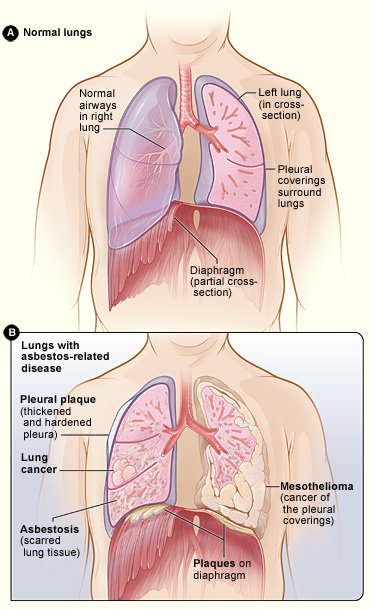Asbestos Awareness is a phrase we have all heard, but do we really know what it is?
Asbestos is a naturally occurring mineral which has been used as a construction material for thousands of years. However, it was the Industrial Revolution that put asbestos to commercial use, specifically due to its wide range of properties. Asbestos is non-flammable, flexible, durable and malleable, being used as insulators for turbines, steam engines, boilers and electrical generators. Additionally, asbestos was used as a commodity for building, binding and strengthening.
By the 1970s, asbestos was an important ingredient in concrete and even used in the manufacture of automobile clutches. The consumption of asbestos across the developing world reached its height during this time and mining became an expanding business in a response to the world’s increasing appetite.
So why is Asbestos so dangerous?
In the last forty years or so, severe health risks have been identified and linked to, the inhalation of asbestos fibres. When asbestos is disturbed, fibres are released into the air, if inhaled, these fibres can cause a spectrum of serious, sometimes fatal lung diseases.
Asbestosis can cause scarring of lung tissue, leading to long term breathing complications; mesothelioma is an asbestos related cancer that can affect the lungs, abdomen and heart. As asbestos related diseases can take years to develop and despite being banned as a building material in the late 1990s and an EU – wide ban since 2005, new cases are still being reported. In the UK alone, asbestos still causes approximately 5000 deaths a year.
Who should take an Asbestos Awareness Course?
According to current regulations (The Control of Asbestos Regulations 2012), all employers have a legal duty to provide information, instruction and training to any employees who are likely to be exposed to Asbestos Containing Material (ACMs) as part of their work. As a result, Asbestos awareness training is suitable for all employees at any level within an organisation.
Taking these precautions could avoid lengthy, expensive legal compensation and save lives!
Tradespersons
According to the Health and Safety Executive (HSE), asbestos kills 20 tradesmen every week. It is, therefore, important that self-employed individuals, contractors and workers are appropriately trained, can protect themselves, and avoid putting others at risk of exposure. These include demolition and construction workers, general maintenance staff, electricians, plumbers, gas fitters, roofers and plasterers.
Licensed Contractors
Where employees are undertaking higher risk work with asbestos, employers must hold a licence granted by the HSE before commencing any work with asbestos material. Licensed Contractors should have an in depth understanding of asbestos and its dangers and know how to safely remove and dispose of asbestos material.
Building Owners
If you are a building owner, and/or are responsible for the maintenance or repair of non-domestic premises, you have a duty of care to manage any asbestos in that building.
This duty covers all non-domestic premises including industrial and commercial buildings such as factories, warehouses, offices and shops. Public buildings such as hospitals, schools and leisure centres are also included in this duty.
Although the duty to manage asbestos does not extend to private domestic buildings, it is relevant to communal areas of multi-occupancy premises such as flats.
As a duty holder, what do you need to know?
It is your responsibility to find out if asbestos is present in your building. Once this has been established, the location, condition and type of asbestos must be recorded and risk assessed. Any identified risks should be managed and monitored by way of an action plan. These plans should be made available to any tradesperson working at your premises.
Members of the public.
If undisturbed and in good condition, asbestos is unlikely to cause harm. However, it would be wise that homeowners and tenants are aware of asbestos and where to go for advice if needed. Further information and guidance can be found at the Health and Safety Executive.
 What training do you need and where to find it?
What training do you need and where to find it?
The type of training you require will ultimately depend on your level of involvement with and potential exposure to Asbestos material.
VinciWorks offer a UKATA (Category A) Asbestos Awareness Certified eLearning Course. This two hour course is an essential prerequisite for any Tradesperson who is likely to come into contact with ACMs and has been certified by the United Kingdom Asbestos Training Association (UKATA). This modular course provides an in-depth range of key topics including all relevant requirements: The Control of Asbestos Regulations 2012, Regulation 10, and the Approved Code of Practice L143 second edition, Managing and Working with Materials Containing Asbestos.
Successful completion of the VinciWorks UKATA Category A Certified Online Asbestos Awareness Course will provide users with the knowledge needed to identify the presence of asbestos, the different types of asbestos, the health risks associated with exposure to asbestos material and highlight the importance of safe working practices.
Request a FREE TRIAL of WorkWize, our award-winning Learning Management System.
